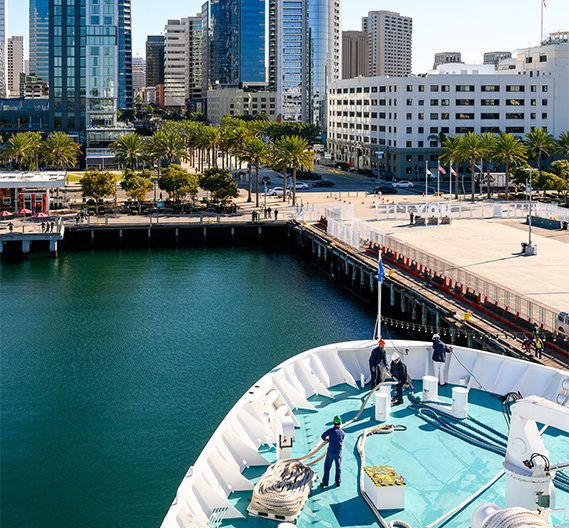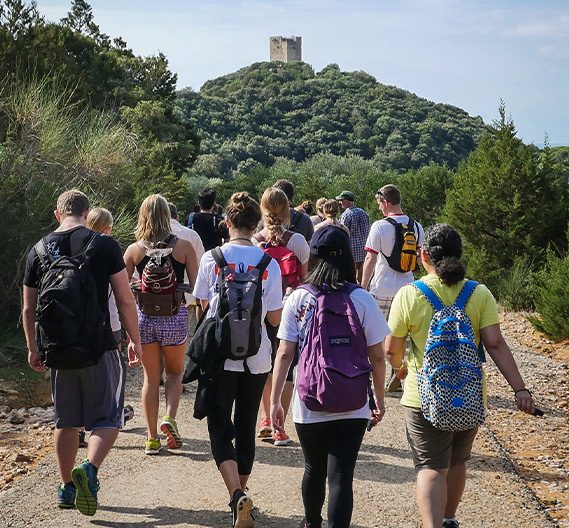All Semester at Sea programs utilize contracted and insured local partners who have been vetted and demonstrate a commitment to health and safety with a proven track record. These contracted partners meet minimum insurance requirements, guide training expectations, and emergency response preparedness. Partners undergo a thorough inspection and on-site re-evaluation every three years (or sooner).
Safety
Health & Safety On Land
In every port we visit, voyagers are supported with the resources they need to ensure their health and safety.
Overview
While not at sea, voyagers participate in a combination of Semester at Sea-sponsored Field Classes, Field Programs, and personal exploration. All voyagers (and their loved ones) are encouraged to do their own research to understand and consider the risks inherent in traveling to the various ports of call.
Suggested resources to help guide your research:

Planning for Safety
All countries on all SAS voyages must pass a health, safety, and security assessment, both at the time of itinerary planning as well as closer to the ship’s arrival.
Prior to arrival in each country, ISE administrators consolidate all updated health, safety, and security briefings and recommendations obtained from various resources including but not limited to: U.S. State Department, World Health Organization, U.S. Centers for Disease Control, Cultural Insurance Services International (CISI), and their contracted intelligence and medical partners. This “just-in-time” updated information is used to make decisions and is provided to the Voyage Leadership Team to share with the shipboard community.
Health and safety information is shared in presentation format during a mandatory “Pre-Port” meeting, and key information is provided in writing on the “green sheet” (emergency contact information, key reminders, logistical information about the ship’s location, etc.). These essential community-wide meetings provide voyagers with specific details about the health, safety, and security risks and any specific Semester at Sea policies or expectations related to the upcoming destination.
Prior to embarkation voyagers are provided an “in-country planning guide” (see example Fall-2022-In-Country-Planning-Worksheet) and are encouraged to arrive at the ship with a rough plan for each country. Once on board, students are encouraged to connect with like-minded travel buddies. These connections are supported by Student Life programming and student organizations.
As a result of the COVID-19 pandemic, our team is also carefully observing vaccination and infection rates of countries on our planned itinerary. A level 3 or 4 warning issued by the U.S. State Department due to the prevalence of COVID-19 may not preclude a voyage from visiting a particular country, as our entire ship is vaccinated against the virus.
Semester at Sea-Sponsored Field Experiences
Participant health and safety is the number one priority on all Semester at Sea-organized Field Classes and Field Programs. Some key preventative measures include contracted tour operators/vendors/partners, vehicle safety, food and water, faculty and staff involvement, and personal exploration.

Health & Safety Considerations in Port
Some areas visited by Semester at Sea can pose some risks for malaria, yellow fever, and/or other infectious diseases. Semester at Sea recommends voyagers consult personal health care physicians and the Centers for Disease Control and Prevention (CDC) regarding specific health conditions and vaccination requirements or recommendations specific to the countries (and regions) you plan to visit. Yellow fever inoculation is sometimes required for entry into some destinations. Malaria is endemic in many areas visited on Semester at Sea, though potential exposure will vary for each participant depending upon individual travel plans.
New immunization requirements may be imposed at any time by the governments of the countries on our itinerary. Semester at Sea cannot provide medical advice regarding the prescription of inoculations and cannot be held responsible for unannounced health requirement changes.
Voyagers with serious known medical conditions, such as asthma or anaphylaxis, have an increased need to create a plan with their physician in advance of the voyage to address the limited availability of resources and immediate emergency medical response in some locations.
Emergency medical evacuations are available in all ports of call; however, in more remote areas of any country, medical attention and evacuations may be unavailable or not close by. The quality of medical care and emergency response transport may not be at the same standard as in your home country. Additionally, in remote areas of any country, cell phone service and Internet may be inconsistent or unavailable. Semester at Sea provides information about medical capabilities in each country within the participant portal accessible during the preparatory phase. While on the ship, health and safety information can also be accessed through the ship’s intranet, “Homeport.”

Accessing the Ship
Voyagers are welcome to use the ship as a floating hotel for their home base while in port — although they are not required to. The ship maintains tight security while in port. Much like undergoing a series of essential security checkpoints before boarding an international flight, Semester at Sea promotes a multi-level security plan to make certain that only our participants and registered guests gain access to our ship. To enter or exit the ship, all participants must scan their voyage ID and pass through a metal detector staffed by the ship’s officers and crew. Unauthorized persons are not allowed access to the ship. Personal belongings are searched and/or scanned by X-ray whenever participants enter the ship. Any prohibited items are confiscated at this time. At the port/pier, Semester at Sea has a contractual agreement with each country’s port agent to provide security at the port entrance and to patrol the pier area where the ship is docked. Semester at Sea crew provide 24/7 security on the ship itself.
If the ship is located at a berth that is not in a pedestrian-friendly area, Semester at Sea works with the port agents and tour operators to coordinate shuttle service.